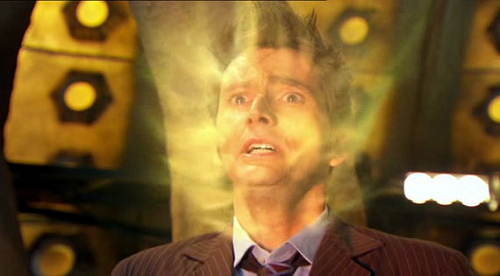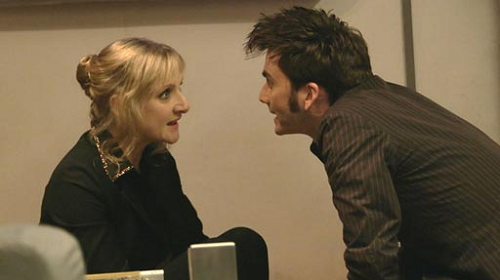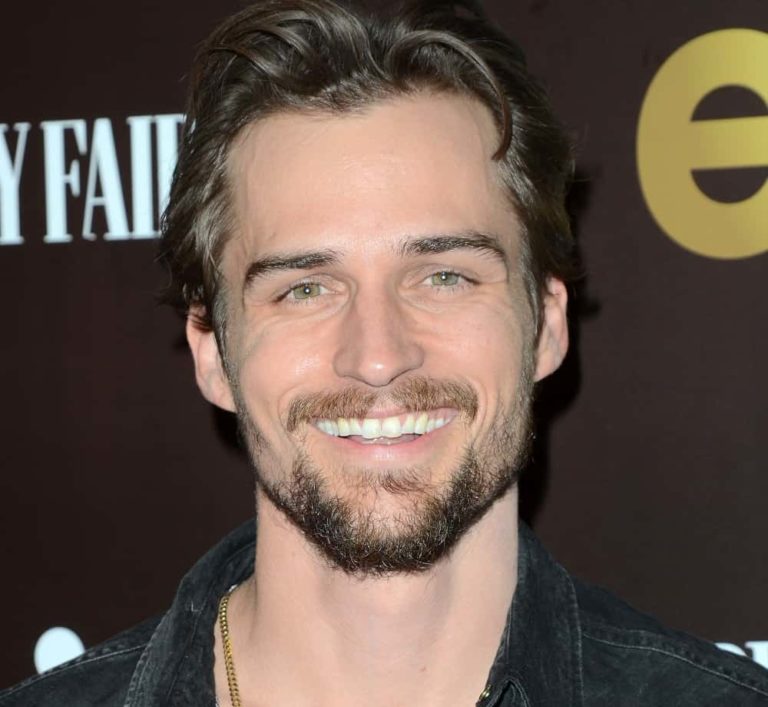When Ninth Doctor Christopher Eccelston left Doctor Who after only one season, he left behind a set of episodes that were a great reintroduction to the classic series but more than anything, they were a springboard for whoever was going to take over the iconic role next. David Tennant’s Tenth remains one of the most memorable and beloved Doctors in the show’s long history. Bolstered by a robust and often deeply moving performance by Tennant, this five year run produced some of the finest Doctor Who stories in the show’s 50 year run. Here are Ten’s ten best stories:
 10. “Blink”
10. “Blink”
Written by Steven Moffat
Directed by Hettie MacDonald
Aired June 9th 2007
“Blink” introduces the Weeping Angels, one of the most terrifying villains in the Doctor Who universe. Breaking the show’s usual format, this story barely features the Doctor and his Companion at the time, Martha (Freema Agyeman), and instead focuses on Sally Sparrow (Carey Mulligan), a young woman investigating the strange disappearance of her friend. Her search brings her into the Doctor’s path when she must face the Weeping Angels, one of the universe’s oldest creatures. They’re extremely deadly and have a perfect defense mechanism- while being observed, they become quantum-locked (they turn to stone) but when as soon as the observer turns away, they’re free to move again and with just one touch, the Angels send their unsuspecting victims back in time, letting the Angels feed on the displaced time energy. With this creative, unkillable foe, the Doctor out of commission in the past, a strong central performance from Oscar nominee Mulligan, and wonderfully atmospheric direction from Hettie MacDonald, “Blink” is an excellent episode, perhaps one of the best in NuWho history.
9. “The Fires of Pompeii”
Written by James Moran
Directed by Colin Teague
Aired April 12th 2008
Destined to go down as upcoming 12th Doctor Peter Capaldi’s first appearance on the show, “The Fires of Pompeii” is memorable for much more than this. A strong episode, this story puts the Doctor in a particularly difficult moral quandary, one that the audience can understand and relate to, as it’s drawn from our history. Over and over again the audience has been told that the Doctor does not and will not interfere with history. Forced to actively cause Pompeii’s destruction when aliens prevent Vesuvius from erupting, the Doctor and Donna (Catherine Tate), who is thrown in the deep end in her first trip in the TARDIS, live up to this principle, despite the horrific cost. But when Donna all but demands for him to save one family from the devastation, the Doctor’s choice isn’t an easy one. This central dilemma makes for a stellar story, one of the Tenth Doctor’s best.
8. “Last of the Time Lords”
Written by Russell T. Davies
Directed by Colin Teague
Original airdate June 30, 2007
From John Simm’s first appearance as The Master, it was clear that he was a whole new breed of villain and would likely take that character somewhere it had never been before. He’s a worthy opponent for the Doctor and takes (almost) every precaution against him, but he overlooks Martha Jones, who executes the Doctor’s plan, working tirelessly and traveling the globe on foot for an entire year to spread the word of the Doctor and give him the psychic boost he needs to regain his strength and overpower the Master. In the end though, he’s not out for vengeance, stopping the Master but offering forgiveness, and this is what the Master cannot handle, choosing not to regenerate when the time comes, effectively killing himself and leaving the Doctor alone as the only Time Lord once again. This episode is a great conclusion to the three part Master story and makes his reappearance in “The End of Time” all the better.
7. “Human Nature”
Written by Paul Cornell
Directed by Charles Palmer
Original airdate May 26, 2007
Over David Tennant’s tenure as the Doctor he frequently had the opportunity to show off his acting chops and “Human Nature” is one of the best examples. Forced into hiding, the Doctor does something no one could expect- he becomes human. This gives the show the chance to explore the Doctor’s deep love and respect for humanity as well as contrast his usual self with who he might be had he been born a man. “Human Nature” features some of David Tennant’s best moments, but also highlights Martha. Much of her tenure as a Companion emphasizes by her unrequited love for the Doctor, who always keeps her at arm’s length. He is a Time Lord, after all. But when he becomes human and nothing changes, this hurts even more. Her painful admission, “You had to go and fall in love with a human… and it wasn’t me” is a powerful moment for the character.
6. “The Girl in the Fireplace”
Written by Steven Moffat
Directed by Euros Lyn
Aired May 6th, 2006
“The Girl in the Fireplace” is one of the Tenth Doctor’s most emotional stories. It may be a one off, but it shows just how deeply affected the Doctor can be by the people he meets in passing. This is also one of the most beautifully shot episodes of NuWho, sliding between a sparse spaceship and a sumptuous castle. Each element, from the costuming to the design of the intricate clockwork androids who are the villains of the piece, features intricate detail and is carefully crafted. Companion Rose (Billie Piper) gets to have some fun with Mickey (Noel Clarke) in his first trip on the TARDIS, displaying more maturity than she has in the past, and the Doctor invents the banana daiquiri and gets a new pet. “The Girl in the Fireplace” also highlights just how adventurous and athletic Ten is (he jumps through a mirror on a horse, for God’s sake), plus Madame De Pompedour’s (Sophia Myles) letter to the Doctor at the end is absolutely heartbreaking.
5. “The Christmas Invasion”
Written by Russell T. Davies
Directed by James Hawes
Aired December 25th, 2005
David Tennnat’s first appearance is a well-rounded, often funny introduction to his Doctor. “The Christmas Invasion” is also great for the simple fact that Ten saves the world in his jim-jams. The Doctor loves making speeches (particularly this incarnation) and his “Who am I?” monologue is magnificent. In the final scenes, when the Doctor finally wakes up and saves the Earth at the last minute, we instantly know what kind of Doctor he will be. He’s funny, cute, and scatter-brained even, but he’s fierce and he’s a fighter. He’s humanity’s protector. He’s also the only person strong enough to bring down the Prime Minister with six little words, “Don’t you think she look’s tired?”
4. “School Reunion”
Written by Toby Whithouse
Directed by James Hawes
Aired April 29th, 2006
“School Reunion” marks the gleeful return of beloved Companions Sarah Jane Smith (Elisabeth Sladen) and K-9. In addition, this story boasts a very good, well written story involving an alien life form (led by Anthony Head) and a suspiciously perfect student body at a comprehensive school. What makes “School Reunion” stand out above other Doctor Who stories is the return of Sarah Jane. Elisabeth Sladen was a beloved member of the Doctor Who family and getting a chance to see her act alongside Ten is a real treat. This appearance also led to The Sarah Jane Adventures, a spinoff children’s series featuring Sarah Jane that became a big hit and endeared Sarah Jane to a new generation of children. Her return stings more now knowing that Sladen is gone, but “School Reunion” stands as a great reminder of why she was so loved by fans and critics alike.
3. “The Unicorn and the Wasp”
Written by Gareth Roberts
Directed by Graeme Harper
Aired May 17th, 2008
“The Unicorn and the Wasp” is a simple story that is deeply charming, frequently fun, and ultimately a moving episode. Historical characters in Doctor Who aren’t anything new but the idea of Agatha Christie, one of the greatest mystery writers of all time, partnering up with the Doctor is just too good to resist. Ten is always the smartest person in the room and having him paired up with Christie is at times frantic, hilarious, and fun. The ending is a real treat too, weaving in Agatha Christie’s own real life sad mystery. From its lovely setting (a beautiful English manor) to it’s nod to Christie’s And Then There Were None, “The Unicorn and the Wasp” is Doctor Who’s take on classic detective films, somewhere between Miss Marple and Nick and Nora Charles.
2. “The End of Time Part 2”
Written by Russell T Davies
Directed by Euros Lyn
Aired December 25th 2009- January 1st, 2010
“I don’t want to go.” With those five heartbreaking words, one of the best Doctors in the show’s history regenerated. It had been an exceptional five years. Part one and two are action-packed, but by the time the Doctor begins visiting past companions, making amends, and saying his goodbyes (in his own way of course), it’s clear that not only are we saying goodbye to Ten, but the writers are also allowing us a much needed goodbye to Tennant. It was the perfect, albeit devastating, end for a great Doctor. Those final moments alone would be enough to make a great episode but it’s all the tiny scenes building to it that make “The End of Time Part 2” so special. We’re even lucky enough get the return of Jon Simm as The Master, who’s finally allowed some kind of peace from the persistent drumming that’s haunted him since he was a child. As a whole, “The End of Time Part 2” is a beautiful and deeply moving goodbye to Ten.
1. “Midnight”
Written by Russell T Davies
Directed by Alice Troughton
Aired June 14th, 2008
“Midnight” is one of the most terrifying and wrenching episodes of NuWho and one of the best in the show’s long history. There isn’t any visible monster and most of the real terror comes from a group of humans. When the Doctor and Donna take a vacation on the resort planet Midnight, Donna enjoys the spa while the Doctor sets out on a sight-seeing trip in a shuttle that unexpectedly stops, leaving the passengers to fend for themselves. Ordinarily this wouldn’t be that bad, but when one passenger starts repeating everyone and a rhythmic knocking pounds on the outside of the hull, they start turning on each other. “Midnight” focuses more on the Doctor than any other episode of series 4 and what we are given is an exceptionally powerful, beautifully acted episode that leaves the viewer breathless more than once. More than just a great episode, “Midnight” is best story of Tennant’s run as the Tenth Doctor.
Tressa Eckermann













